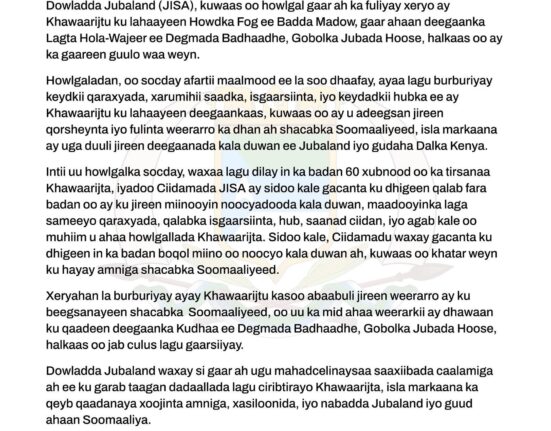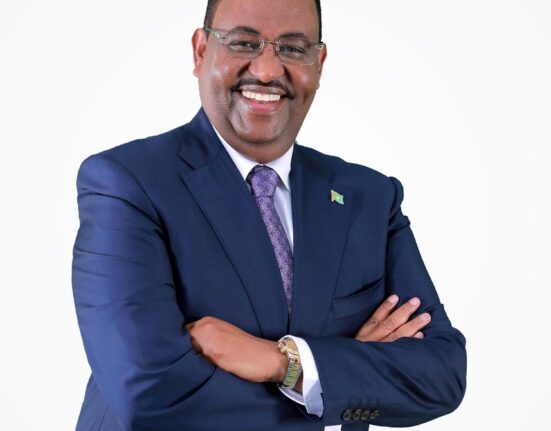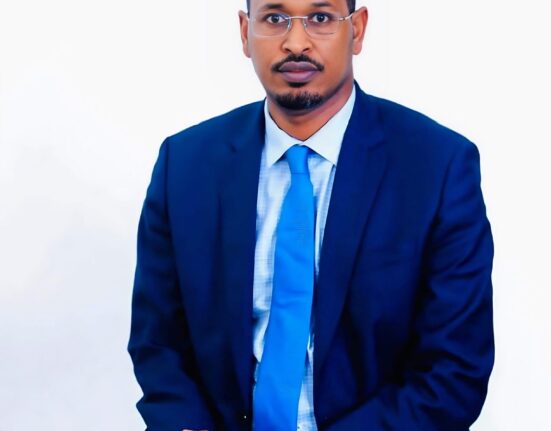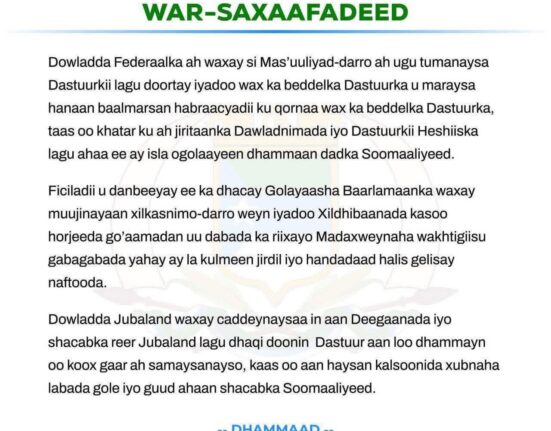By Abdulkadir Farah
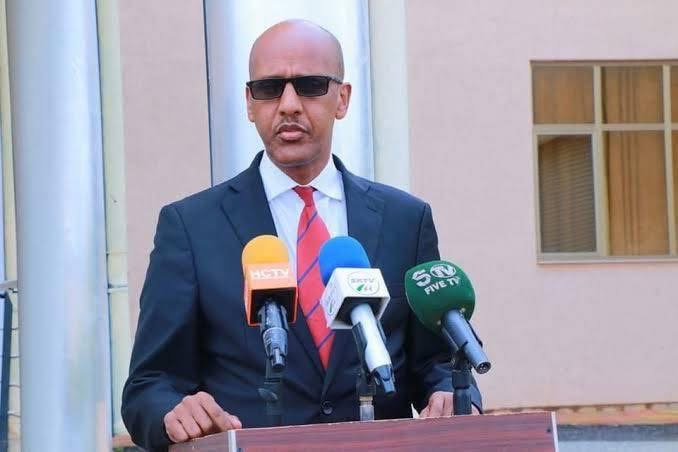
President Mustafe Omar, the leader of Ethiopia’s Somali Regional State, has once again taken to social media to deliver a scathing rebuke of what he calls “revisionist political sloganeering” — a sharply worded post aimed at minority elites, historical nostalgia, and glorification of authoritarian pasts. On the surface, it reads like a passionate call for forward-looking politics and inclusive dialogue. But for those who have followed Mustafe Omar’s political journey closely, the message is nothing short of a well-rehearsed performance, riddled with contradictions and blatant political gymnastics.
Let us be clear: the president’s post, shared via his official X (formerly Twitter) account, did not emerge in a vacuum. It comes at a time when the national political landscape is shifting rapidly. Elite alliances are cracking, discontent is growing in the regions, and the federal government — under the strained leadership of Prime Minister Abiy Ahmed — is increasingly surrounded by uncertainty. Mustafe Omar, a political survivor first and foremost, is now attempting to reposition himself. But his latest attempt is not convincing — not to the people of the Somali Region, nor to federal actors who know his history too well.
From Silent Ally to Loud Critic?
In his post, Mustafe derides the glorification of a feudal emperor (an apparent jab at Haile Selassie), a military dictator (clearly referencing Mengistu Haile Mariam), and a “vindictive” rebel leader (undoubtedly referring to the late Meles Zenawi or the TPLF leadership). He frames these legacies as toxic, destructive, and incompatible with modern Ethiopia’s aspirations. Ironically, the very forces that Mustafe now describes in such pejorative terms were, not long ago, either his silent partners or ideological allies.
Let’s not forget: when Mustafe Omar rose to power in 2018 amid the political opening created by the downfall of the TPLF-led EPRDF, he did so with the implicit backing of federal elites and regional Amhara political operatives who were eager to install a loyalist in the Somali Region. He echoed their anti-ONLF, anti-Oromo Liberation Front, and anti-federalist sentiments — while selling the image of a peace-loving reformer to the international media. Mustafe was welcomed as a ‘New Ethiopia’ poster boy, despite carrying no revolutionary credentials. He was a centralist at heart, cloaked in federalist rhetoric.
What has changed now? Why this sudden turn against “minority extremists” and glorified pasts?
The truth is that this isn’t a transformation. It’s a calculated pivot.
A Politician’s Desperate Pivot
Mustafe Omar’s political base is eroding. His iron-fisted rule over the Somali Region has faced growing resistance — not just from traditional opposition groups, but also from the youth, civil servants, religious communities, and once-loyal clan networks. Accusations of corruption, repression, arbitrary arrests, and the weaponization of aid have dogged his administration. As his legitimacy wanes at home, he now seeks to rebrand himself on the national stage as a staunch defender of reform and an ally of Abiy Ahmed.
But let us not be fooled.
His sudden condemnation of “sectarian hegemonies” is not rooted in principle, but in political necessity. His record speaks volumes. Mustafe Omar has never been a consistent defender of democratic values, minority rights, or inclusive federalism. He has aligned himself with whoever offered political protection — from TPLF-linked bureaucrats in his early days, to centralist circles in Addis Ababa, to security institutions eager to suppress dissent in the region.
His loud support of Abiy Ahmed today is not a matter of ideological conviction — it is a survival strategy. He knows the winds are shifting, and like a seasoned politician clinging to relevance, he is trying to ride the next wave before it crashes.
Abiy Ahmed Knows Better
But here lies another contradiction. While Mustafe publicly positions himself as a loyal backer of Abiy Ahmed, the Prime Minister is no stranger to the Somali leader’s double-dealing. Abiy has observed Mustafe’s private flirtations with Amhara elites, his transactional alliances with federal security figures, and his repeated attempts to undercut genuine regional autonomy in exchange for personal security. The Prime Minister, for all his own political flaws, is unlikely to forget who stood where during Ethiopia’s most critical moments.
Abiy Ahmed is a strategic actor. He may smile for the cameras, but he understands the nature of political betrayal — and who might betray him tomorrow. Mustafe’s overblown rhetoric against revisionists will not erase his past complicities, nor will it suddenly elevate him into the circle of trusted reformers.
In short, I don’t think Abiy Ahmed will fall into the trap of believing Mustafe Omar’s convenient reinvention. The Prime Minister knows too well the character, ambition, and inconsistency of his Somali counterpart.
Words Are Cheap — Reality Isn’t
The Somali Region deserves better than political theater and opportunistic grandstanding. The people are not fooled by fancy words or long posts on X. They see the repression, they live the poverty, they suffer the lack of representation, and they know who is responsible. Mustafe Omar’s attempt to portray himself as a forward-looking leader is not only insulting — it is dangerous.
By pretending to attack revisionist elites while protecting his old networks, Mustafe is deepening the mistrust that already exists between federal institutions and regional states. By faking loyalty to Abiy Ahmed while preserving his own survivalist agenda, he is contributing to the very crisis of leadership that Ethiopia finds itself trapped in today.
If there’s one truth in Mustafe’s entire post, it’s this: “There are no glorious past political days to look back to.” Indeed. But we must also be careful not to allow false prophets of the future to lead us backward in disguise.
Note: The views expressed in this article are those of the author, Abdulkadir Farah, and do not necessarily represent the official stance of HornCurrent.com.




